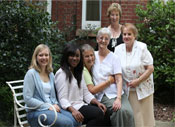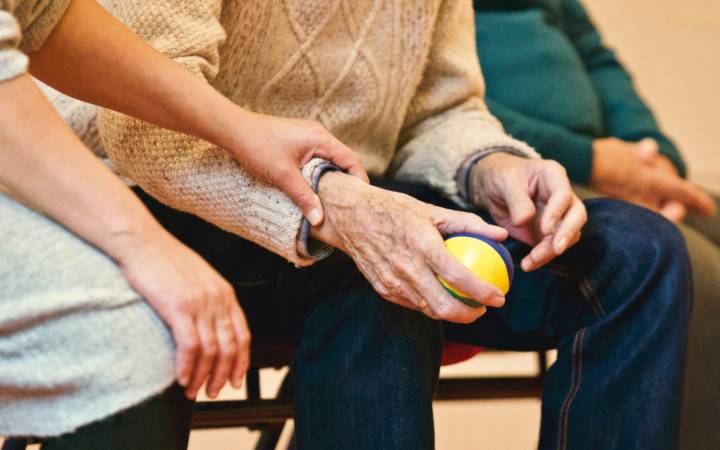Investigating the experiences of carers
Posted Friday 4 May 2012
It is estimated that in the UK there are approximately six million carers – families or friends who without payment look after someone, often a spouse or elderly parent. By 2037 this figure is expected to rise to nine million. Many of us will be carers at some point and every year about two million people in the UK take on the role. Carers undertake a huge number of tasks from personal care including washing and toileting, managing finances, takingto hospital appointments and emotional support. Over a million people care for more than 50 hours a week but this is often longer especially amongst older people. This vast unpaid workforce is thought to save the economy a staggering £119 billion annually (Carers UK, 2011).
Not surprisingly providing this level of support can have adverse consequences for carers who report emotional (eg anxiety and depression) and health difficulties (e.g. exhaustion and back problems) and often suffer from social isolation. Carers frequently say that informal support from others rapidly dwindles over time. This may be because other people assume they are managing well or because the very isolation of being a carer means that they are no longer good company. It is also possible that others are embarrassed by the person being cared for, particularly if they suffer from cognitive difficulties associated with conditions such as dementia or stroke.
Typical comments from carers in our research include:
'And all of a sudden nobody wants to know you. So all the friends you've had disappear. So from going out and meeting people, suddenly I am indoors all the time and I don't see anybody.'
'....Suddenly not only are you responsible for yourself, but for somebody else and for everything.'
'I don't sleep through the night. Mike can't get out of bed and go to the toilet, so I have go to push, sit him up and then come round and take him to the loo... Sometimes it can be eight times a night and other times two or three.'
 During the last six years I have been working primarily with Professor Ann Mackenzie on a range of studies investigating the impact of caring on carers. The work initially focussed on carers of people who have had a stroke but has now broadened to look at carers in general. Recent research has investigated how general practice and schemes provided by the voluntary sector might help support carers. We have been funded by a number of organisations including the Royal College of General Practice, South Thames Crossroads, The SW London Academic Health and Social Care Network and the Modernisation Initiative.
During the last six years I have been working primarily with Professor Ann Mackenzie on a range of studies investigating the impact of caring on carers. The work initially focussed on carers of people who have had a stroke but has now broadened to look at carers in general. Recent research has investigated how general practice and schemes provided by the voluntary sector might help support carers. We have been funded by a number of organisations including the Royal College of General Practice, South Thames Crossroads, The SW London Academic Health and Social Care Network and the Modernisation Initiative.
The initial work included three published systematic reviews of the impact of caring on carers. We also undertook our own qualitative longitudinal study where carers of stroke survivors were interviewed three times. Early on in the research we aimed to identify issues and concerns for carers that had received little attention previously and to identify any changes over time. Amongst carers of people who have had a stroke, research repeatedly reports carer stress and 'burden', often focussing solely on the negative aspects of caring. We turned our attention to arguably more subtle issues such as the uncertainty carers face and their frequent loss of autonomy. We also highlighted the satisfactions that carers may report, especially as caring progresses. Rewards include feeling pride in their role and seeing improvements in the person they care for. Being able to identify these satisfactions in caring, may help carers cope with their situations. We have recently published a fourth systematic review looking only at these satisfactions in caring.
More recently with input from Dr Ruth Habibi we have been looking at support for carers including respite and peer support or mentoring schemes run by the voluntary sector where former carers support current carers. Such schemes are usually very positively received but it is difficult to identify why they find them so beneficial. For one service that we evaluated, the essential ingredient seemed to be that carers benefitted from the knowing that they were 'not alone' in their experiences and sometimes negative feelings. Former carers seemed able to provide unique support which complemented support families and statutory services. Other schemes may work more by the provision of practical suggestions, signposting to other services and the fact the mentor can offer a different perspective on the carers' situation.
Perhaps one of the most striking findings is the benefits that the volunteers report by being a mentor or peer supporter. The gains can be two-way where the carer and mentor swap experiences with each other. For many volunteers, this role replaces the caring role and provides a new sense of identity. The social support from other mentors is often seen as hugely beneficial.
I am about to embark on a large, two-year NIHR-SSCR funded project looking at satisfaction with social care among stroke carers. There is some evidence that people from minority ethnic groups tend to be less satisfied with social care but the reasons behind this not understood. It might be that they have poorer experiences but it may also be related to different expectations and understanding of what is meant by satisfaction. Most of the research in the area is quantitative and this qualitative research project will look in depth at satisfaction with social care amongst older carers of people who have had a stroke using depth interviews and focus groups with people from a number of ethnic groups. It is hoped that the findings will increase understanding of the expectations and experiences of older minority ethnic carers. Issues and questions relating to service satisfaction and dissatisfaction where minority ethnic groups respond differently to White service users will also be investigated. This exploration of expectations and identification of what participants see as important when evaluating services will provide guidelines for practitioners, facilitate the development of culturally sensitive, responsive services and improve measures of service satisfaction.
Dr Nan Greenwood is a senior research fellow in the Faculty of Health, Social Care and Education. Her background is in the social sciences. She originally worked in mental health research where her research focused on health care satisfaction and ethnicity but more recently she has been investigating the experiences of carers.
Contact us
- For non-student research enquiries, email the Research Support Office
- Research Support Office contacts
- Graduate Research School contacts
- Business and Enterprise Centre contacts
- How to get to Kingston University



